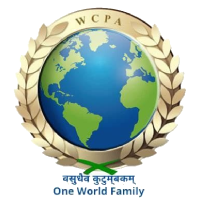WLA 52. Democracy Enhancement Through Corporation Personhood Prohibition Act.
Provisional World Parliament 27th through 31st December 2010, Rabindranath Tagore Auditorium, Bangla Academy, and Sri Aurobindo Bhavan, Calcutta, West Bengal, India
Ministry of Commerce and Trade: Democracy Enhancement through Corporate Personhood Prohibition Act
Short Title: Corporations Act
Whereas, the fourth broad function of the Earth Federation is “to regulate world trade, communications, transportation, currency, standards, use of world resources, and other global and international processes” (Earth Constitution Article 1.4); Whereas, specific powers of the Earth Federation include the power to “define and regulate procedures for the nomination and election of members of each house of the World Parliament” (Article 4.7);
Whereas, the Earth Federation is responsible to protect the civil liberties identified in Article 12, including “freedom to vote without duress, and freedom for political organization and campaigning without censorship or recriminations” (Article 12.5); Whereas, the Earth Federation is responsible to “define standards and promote worldwide improvement in working conditions,” standards of living, healthcare, sanitation, and other basic necessities for a quality of life for world citizens, including protection of the environment and the ending of war (Article 13); Whereas, the Earth Federation is responsible to “regulate and supervise supra-national trade, industry, corporations, businesses, cartels, professional services” (Article 4.14), and international communications (Article 4.13);
Whereas, in some major nations today, corporations have been granted “legal personhood,” giving them all the rights and privileges of private human persons, with the exception that these corporations cannot die, that individuals operating within the corporation are protected from liability because the corporation itself is considered a collective “person,” that corporations are entities without a conscience mandated solely to make a private profit for their investors, and that corporations, in spite of their vast impact on society, might claim privacy from public scrutiny, and other rights of private persons;
And whereas, within such nations, corporate personhood has given corporations the “free speech” of private persons through which they have used their vast economic resources to colonize and destroy the democratic process, engineering the election of law-makers beholden to the corporations, employing professional lobbyists for their private ends, and using a variety of means to manipulate government in the service of minority private interests;
And whereas, within the world prior to the advent of the Earth Federation, democracy has been compromised nearly everywhere by the wealth and power of the few to colonize governments and communications systems;
Therefore,
The World Parliament adopts this Act to establish the Ministry of Commerce and Trade, by which the World Parliament eliminates the concept of corporate personhood:
- Only natural persons (human beings) have the rights of legal persons as identified in Articles 12 and 13 of the Earth Constitution.
- Article 2.A Ministry of Commerce and Trade is hereby established. The Senior Administrator of the Ministry of Commerce and Trade shall head a Franchise Office of the Ministry of Commerce and Trade.
The regulative jurisdiction of the Earth Federation is defined by Article 4 of the Earth Constitution. Private corporations under the regulative jurisdiction of the Earth Federation shall seek incorporation by the Franchise Office of the Ministry of Commerce and Trade. The Franchise Office shall require a description of a corporation’s legal mandates specifically defining the functions, responsibilities, and modes of operation. The Franchise Office may approve incorporations that apply to assign legal mandates consistent with the Earth Constitution and world legislation.
- The Franchise Office shall define legal mandates empowering corporations to perform certain economic operations within a framework considering:
- protection of democracy,
- protection of the environment,
- promotion of economic prosperity among people and communities effected by their operations, and, in general,
- the common good of the citizens of the Earth Federation.
- The Franchise Office shall coordinate with the Office of World Revenue to establish fee schedules and to collect incorporation fees at the time of incorporation, as well as periodic fees for the maintenance of the franchise process.
- Incorporation fees are in addition to any licensing and use fees for commerce or industry involving hydrocarbon resources, as established in World Legislative Act #16, Articles 16.5 and 16.6. Entities seeking world federal incorporation shall show proof of payment of hydrocarbon resource usage fees and any fines as a mandatory part of the incorporation licensing process. The order of application is payment of usage fees (including any back fees or fines from years since establishment of the Hydrocarbon Resource Board) and then incorporation fees. If the Franchise Office grants incorporation, then the corporation may also apply for hydrocarbon license from the Hydrocarbon Resource Board to continue operations.
- Article 3Private, profit-oriented corporations do not have the right, as collective entities, to promote any candidate for election or any political cause within the Earth Federation, nor to contribute funds or campaign contributions or other economic support to candidates for office.
- However, individuals working within any corporation, have the free and full right to participate in promoting candidates for election or any political cause they choose,
- Individuals working within any corporation have the right to contribute funds to political campaigns within limits the World Parliament defines.
- Article 4.Private individuals have the right to promote candidates or causes of their choice within the legal criteria that the World Parliament legislates. World Parliament formulates criteria within a framework that limits the ability of wealthy individuals to unduly influence or colonize the political process.
- Article 5.Non-profit political associations of private individuals (as, for example, political parties, advocacy groups, or think tanks) shall register with the Earth Federation and operate within whatever legal limits, transparency, and other criteria the World Parliament defines.
- Article 6.Elections conducted under the World Parliament are free, and fair. Independent observers may monitor the elections.
- Each candidate shall use a government defined and paid for information booklet (which may also be electronic), of a standard size and overall format to be used for campaign purposes (as specified in Article 8.3.1.5 of the Earth Constitution and in World Legislative Act Number29,the Elections Act).
- Earth Federation policy is to approach and attain for each candidate equal access to public communications media (electronic or print) under limits and conditions the World Parliament defines.
- Each candidate has the right to use private communications media (electronic or print) as paid for by non-profit advocacy groups or contributions of private citizens under limits and conditions as defined by the World Parliament.
- The World Boundaries and Elections Administration may pay for the cost of information booklets using world currency and credit in Earth Hours. The WBEA shall elaborate a process for approaching and attaining equal access regarding the information booklets. Political parties are responsible for their own printing costs as per World Legislative Act #29.7.
- Article 7.Private, profit-making communications media that are international in scope also fall under the category of corporations and agencies requiring regulation by the Earth Federation (Earth Constitution, Articles 1.4 and 4.13).
- Profit-making communications corporations are not recognized as legal persons within the Earth Federation.
- The World Parliament recognizes that profit-making communications corporations may play an important role in fostering democratic processes, the diversity of voices necessary to vigorous dialogue and debate, and disseminating information necessary to democratic decision-making.
- With this possibly important role in mind, the World Parliament and Ministry of Trade and Commerce might wish to define legal incorporation for such entities differently from that from other profit-making corporations.
- Nevertheless, the Franchise Office of the Ministry of Trade and Commerce shall define legal powers of profit-making communications corporations within a framework directed toward maximizing the democratic powers of individual persons for participation in political processes and protecting the rights of individual persons to speech and political participation as define in Earth Constitution Articles 12 and 13.
- The framework identified in 7.4 may be fostered, for example, through anti-trust or anti-cartel laws that break up media conglomerates into a number of smaller, competing voices, or through legislation requiring the airing of opposing viewpoints.
- Article 8.When considering legislation concerning the items specified under this Democracy Enhancement and Corporate Personhood Abolition Act, the World Parliament shall seek input from each of the agencies within the Integrative Complex of the Earth Federation and from any other ministry or agency of the Federation deemed appropriate.
- Since the World Boundaries and Elections Administration (WBEA, Earth Constitution Article 8.3) is responsible to define the procedures for properly democratic elections (8.3.1.5) and defines the rules for world political parties (8.3.1.6), this agency shall submit annual reports to the World Parliament regarding the successes and difficulties of democratic elections with respect to the functioning of concentrations of private wealth (wealthy individuals or profit-making corporations) and with respect to the operations of communications corporations.
- In these reports, WBEA shall include factual assessments of the degrees to which free and fair popular democracy in the service of the majority of people is disrupted by private wealth, profit-making corporations, and/or communications corporations.
- Article 9.Penalties for violations of this act are subject to the sentencing parameters of the World Penal Code (World Legislative Act #19.) enforced by the world police and world courts. Subject to review by the World Parliament, the Franchise Office may assess administrative fines in civil affairs for non-compliance with the policies of the Ministry of Industry and Commerce. The Franchise Office may assess administrative fines for non-compliance with decisions of the World Parliament. In the case of fines of one month’s income or more, the Franchise Office may file civil charges with the World Bench for Public Cases. Similarly, in cases of fines of one month’s income or more, a corporation may appeal the Franchise Office decision to the World Bench for Public Cases.
- Penalties apply to individuals as well as to corporations, as per World Legislative Act #19. Whenever corporate violations occur, the Enforcement System may vigorously investigate whether individual violations have also occurred. The Enforcement System may assertively pursue individuals suspected of corporate crime.
- The penalties and courts shall normally assess greater responsibility to those higher up in the corporate hierarchy, keeping in mind that obeying orders from one’s authority does not exonerate any individual who knowingly breaks the law.
- Whistle blowers and others who report abuses with regard to this act have protection by this law from retaliation by their employers. The World Ombudsmus shall monitor situations of alleged retaliation and protect the rights of the persons involved. Retaliation for report of abuse of this Act is unlawful (world penalty classification to reflect the seriousness of the retaliation. See World Legislative Act #19.)
- Whether a corporate charter has been denied, revoked or expired, operating an organization under world federal regulative jurisdiction, as defined by Earth Constitution Article 4, without a valid, current corporate charter is unlawful. (World Class 3 Felony).
- Entry into Force. Civil provisions of this Act enter into force immediately by the adoption of the Provisional World Parliament. Criminal provisions of this Act enter into force one year from the beginning of the First Operative Stage of Earth Federation, unless the Enforcement System and World Court System can bring about adjudication at an earlier date, or unless the World Parliament otherwise decides an earlier date.
Adopted as amended, 10:57 a.m., 29 December 2010, by the 12th Session of the Provisional World Parliament.
Attested,
Eugenia Almand, JD, Parliament Secretary

